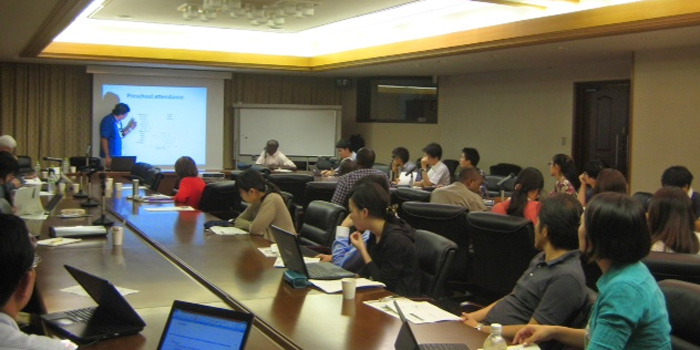Advanced Overseas Research in Angola
From December 2024 to February 2025, I traveled to Angola, a country located in the southern part of Africa to collect primary data for my dissertation. The research study titled...
Graduate School of International Cooperation Studies (GSICS), Kobe University


On Monday, June 16th, 2014, a Development Management Policy Seminar on “International Education Cooperation in the Post-2015: Perspectives from International Organizations” was conducted in the main conference room in Kobe University’s Graduate School of International Cooperation Studies (GSICS). For this seminar, two international experts on education development were invited. One of them was Dr. Eduardo Velez Bustillo, a former Sector Manager at the World Bank and currently an Adjunct Professor at Georgetown University. The other speaker was Ms. Lina Benete, an Education Policy Specialist at the UNESCO Asia and Pacific Regional Bureau for Education (UNESCO Bangkok).
 Dr. Velez Bustillo gave a presentation on “The New Architecture to Support Education in Developing Countries: A Complex Scenario the New Architecture to Support Education in Developing Countries”. He first talked about the importance of education in terms of investment,particularly for early childhood development (ECD) and for girls’ education in developing countries. He mentioned that new mechanisms to support education investments in developing countries have become ineffective, and while they were meant to resolve some problems,they are in fact creating other issues. He also mentioned problems with planning, such as identifying goals and timelines for developing countries to achieve; some goals like the ones set by EFA or MDGs have been unreachable. He criticized the newly proposed post-2015 objectives and indicated that the World Bank has tried to accommodate these new objectives by cooperating with clients, UN Agencies, and other bi-lateral and CSO organizations.
Dr. Velez Bustillo gave a presentation on “The New Architecture to Support Education in Developing Countries: A Complex Scenario the New Architecture to Support Education in Developing Countries”. He first talked about the importance of education in terms of investment,particularly for early childhood development (ECD) and for girls’ education in developing countries. He mentioned that new mechanisms to support education investments in developing countries have become ineffective, and while they were meant to resolve some problems,they are in fact creating other issues. He also mentioned problems with planning, such as identifying goals and timelines for developing countries to achieve; some goals like the ones set by EFA or MDGs have been unreachable. He criticized the newly proposed post-2015 objectives and indicated that the World Bank has tried to accommodate these new objectives by cooperating with clients, UN Agencies, and other bi-lateral and CSO organizations.
Ms. Benete’s presentation on “Post-2015 Development Agenda: Education for Global Citizenship”explained the progress towards EFA and MDGs goals and the process of post-2015 agenda setting, including proposed focus areas in education beyond 2015. She also introduced the Global Citizenship Education Initiative, a major international undertaking to generate actions and engagement through civic actions in the public domain to promote a better world and future, and how UNESCO has contributed to this initiative through specific activities.

 To conclude the seminar, Dr. Kim “Korbil” Ki-Seok, Emeritus Professor at Seoul National University as well as a Visiting Professor at GSICS, and Dr. Jun Kawaguchi, Assistant Professor at Osaka University, provided their comments. Dr. Kim emphasized the importance of real voices from developing countries and the inequity of information and opportunities for people in developing countries. Dr. Kawaguchi commented on the sensitivity of the word, “Global Citizenship,” and the difficulties of “Harmonization”among development organizations.
To conclude the seminar, Dr. Kim “Korbil” Ki-Seok, Emeritus Professor at Seoul National University as well as a Visiting Professor at GSICS, and Dr. Jun Kawaguchi, Assistant Professor at Osaka University, provided their comments. Dr. Kim emphasized the importance of real voices from developing countries and the inequity of information and opportunities for people in developing countries. Dr. Kawaguchi commented on the sensitivity of the word, “Global Citizenship,” and the difficulties of “Harmonization”among development organizations.
This was an extremely valuable experience for students and young researchers to think about how education can alleviate the poor in developing countries. It was also a wonderful opportunity for the participants as we all learned a lot from the presentations and hope to take this with us as we endeavor to be development specialists in the near future.